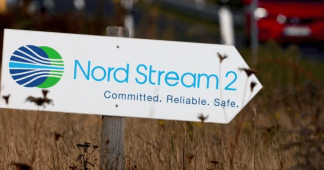By Herman Michiel,
11 February 2022
“If Russia invades Ukraine, the pipeline between Russia and Germany will not become operational. There will be no more Nord Stream 2. We will put an end to that. Promise, we are able to do that.”
Those were words of US President Joe Biden after his meeting on 7 February with German Chancellor Scholz. The media here being what they are, there has been virtually no comment on this, even though it is actually an incredible statement. The American President is saying right off the bat that he will prevent an economic project on the European continent if American demands are not met. We are talking about the undersea pipeline that is intended to bring Russian gas to the north of Germany and supply part of Europe from there. The project is technically ready, and runs alongside the Nord Stream 1 line, which has been in operation for 10 years, transporting around 50 billion cubic metres of gas a year to Europe. But the German authorities’ approval of Nord Stream 2’s installations is currently being delayed because pressure is being exerted from various quarters not to commission the Russian pipeline, costing around €10 billion, officially as opposition to an imminent Russian invasion of Ukraine. The opponents are first and foremost the United States and Great Britain, and countries such as Poland and the Baltic States that have a historical aversion to Russia. And, of course, Ukraine, which is a transit country [1] for Russian gas to Europe, earning about 1% of its GDP in revenue from it.
A windfall for the environment?
People who are serious about global warming may think that, whatever the motivations, the boycott of natural gas imports, a fossil fuel that generates millions of tons of CO2 when burned [2], is a good thing. However, environment and climate play no role whatsoever in the current conflict over Russian gas. An extreme example might be the Texan Republican senator Ted Cruz, fierce defender of the sanctions against Nord Stream 2, but also of the Keystone XL pipeline, which was to bring tar sands oil from Canada to the States. But for the European Union, too, it would be difficult to invoke climate change, now that it has designated natural gas as a sustainable energy source in its ‘taxonomy’. Another extreme example, but at the other end of the spectrum, are the German Grünen. This party – now in government – is prepared to use Nord Stream 2 as a weapon against Putin and is campaigning for the construction of new LNG terminals to bring American liquefied gas to Europe. Neither the way in which this gas is extracted (fracking) nor the transport with tankers is an improvement on the Russian pipeline in terms of the environment, on the contrary. And the price is not a factor either: Russian gas is said to be up to 50% cheaper than American fracking gas.
Biden versus Trump?
Biden is not Trump. Unlike his predecessor, Biden does not deny that there is a climate problem, and he has taken some timid initiatives in the country with twice the C02 emissions per capita of Europe. During his election campaign, he even seemed to be on the warpath with the oil industry for a while, but of course during such a campaign there is something for everyone. He dismissed the rumours that he would ban oil extraction by fracking as a lie by his Trump counterparts. And just as Trump would have done, he is now trying to stop the flow of gas from Russia and start a flow of American LNG tankers to Europe. If this is not defensible from an environmental and affordability point of view, such a switch would not help the security of supply either. Unlike a pipeline, a tanker can change course. And it does, depending on who is the highest bidder. On the other hand, the chance that Putin will ‘turn off the gas tap’, as the propaganda war is now saying, can be safely forgotten. Call him a scoundrel for all I care, but he will not saw off the branch on which he sits. By the way, everyone has to admit that all contracts with Gazprom are meticulously executed, even now when tensions are rising.
The continuity of American policy
It is useful to recall two episodes from the not so distant past to see that with Biden’s actions against Nord Stream 2 there is not a break, but continuity in American policy.
The ‘Brotherhood’ pipeline that still carries Siberian gas through Ukraine to Europe was built in Soviet times, in the early 1980s. This was not to the liking of Ronald Reagan, who banned American companies from supplying material, and even extended the ban to European companies with branches in the States. He offered Germany to buy American coal instead of Soviet gas, but that did not work out. There is even an earlier case of American interference in the early 1960s, when Kennedy wanted to boycott the ‘Friendship’ pipeline.
Much more recent are the tribulations surrounding the ‘EastMed’ pipeline. A good 10 years ago, gas fields were discovered in the eastern Mediterranean. There was a tug-of-war between neighbouring countries (Israel, Turkey, Cyprus, etc.) over the ownership rights, but finally, early in 2020, an agreement was reached between Israel, Greece and Cyprus (but not Turkey) to build a pipeline via Crete and Cyprus to Greece and further to Europe. The plan was fully supported by the EU and by Washington; Exxon Mobil, by the way, was one of the oil companies involved. But in early January 2022, the US administration informed Israel, Greece and Cyprus that it would no longer support the project. One can see in it a turn against the Trump administration, but some also see in it an American gesture towards Erdogan. The Turkish leader may be a troublesome member of the Atlantic Alliance, but his arms deliveries to Ukraine are appreciated by NATO and Washington.
Yet, are we just going to leave the Ukrainians to their fate?
First of all, let us note that so far there has been no Russian military intervention in Ukraine. The troop presence on the border is rightly perceived as a threat, but even Ukrainian President Zelensky asks his Western allies not to exaggerate that threat. Putin himself keeps repeating that he has no intention of invading Ukraine. This is not a watertight guarantee, but he also knows that NATO would like nothing better, and that it would provide the perfect alibi for Western war language.
Secondly, it is important to make a correct analysis of the nature of the conflict between Russia and Ukraine. Western propaganda speaks of ‘Russian expansionism’, and refers to the annexation of Crimea (2014) as an antecedent. But Putin is consolidating the vast Russian territory as a capitalist state, and his concern is not expansion, but security. There are good reasons for this. Indeed, the West lied to Russia that when the Soviet Union collapsed there would be no expansion of NATO to the east; but meanwhile one can speak of a real encirclement, from the Baltic to Bulgaria. If Ukraine and, if need be, Georgia were to join, the threat would be total. One does not have to be a supporter of Putin to see this.
The annexation of Crimea must also be seen in a security perspective, and not of territorial expansion [3]. It is strategically located on the Black Sea, where the US Navy has an explicit presence. Understanding Russian concerns does not mean approving the annexation, but the understanding is important if the conflict is to be demined.
And it is the latter that we must pursue if we are to help the Ukrainians. A war must be avoided at all costs; eight years of civil war is more than enough. Any supply of arms to Ukraine can only increase the risk of bloodshed. As residents of NATO countries, opposition to the export or transit of weapons is one of the most important ways of helping the Ukrainians.
So it is not weapons, but negotiations that should be promoted. The basis for this exists for several years, the Minsk Accords (2014-15) which are also defended by Russia as a solution. And while Putin has some authority with the Russian component of the conflict in Crimea and eastern Ukraine, the West has some authority with the Ukrainian rulers in Kiev. As is often the case in diplomatic negotiations, none of the parties inspires much sympathy among left-wing observers. But those who are serious about peaceful solutions attach more importance to the outcome of negotiations than to the face of the negotiators.
And the EU in all this?
Whatever reasons Washington may invoke for its opposition to Russian gas for Europe, they are not convincing. Fracking gas is certainly not an ecological alternative to natural gas. If it were a question of diversifying Europe’s energy sources, EastMed (under the control of close US ally Israel) would not have been cancelled out. And as for supporting the Putin regime through natural gas revenues, exports of Russian oil products to the United States hit a record high in 2021…
American foreign policy is, as usual, motivated by geostrategic and corporate interests, which means in a word: imperialism. American imperialism is distinguished from its European competitor, the EU, by the means at its disposal: its gigantic military-industrial complex, its experience with military interventions, its global currency, its presidential regime that insulates a large part of its policies from democratic interference, its island geography that allows it to wage wars on other continents without suffering the consequences of refugee flows and failed states. Add to this the brutality that accustoms the political class to such a position. Who else can afford to create something like Guantanamo and still lecture others about democracy and the rule of law? Who else can afford to threaten an economic project on another continent with statements such as ‘We will put an end to this, we promise, we are capable of doing so’?
For a European, two opposite conclusions may be drawn from this. One can see in the American example the way forward for Europe: to become a military superpower, to increase imperialist power by removing democratic barriers, to assist industrial champions with financial and if necessary military means in order to promote their position in the world. This is the path that the EU wants to follow, encouraged by almost all political families, including social democrats and greens.
Another conclusion is possible: the American example shows perfectly which way we should not go under any circumstances. Where conflicts are brewing, we help to demine them; more democracy is needed, at all levels, starting with the economic system; and we become real globalists, who think about the consequences of our decisions for the rest of the world.
(*) Herman Michiel is the editor of the Flemish-Dutch website ‘Ander Europa’. The present article is the translation (with the free version of DeepL) of Gevaarlijke gasgeur rond Oekraïne, which was published February 11.
[1] Data from the think tank Bruegel indicate that currently about one third of Russian gas comes to Europe via Ukraine, two thirds via Nord Stream 2. On transit prices, see Deutsche Welle.
[2] Another source of greenhouse gas is the methane that escapes from natural gas installations.
[3] There is another aspect to Crimea, which puts the annexation in a somewhat different light. During the Soviet period (1954), the territory changed its constituent republic, from Russia to Ukraine. In 2014, Russia’s annexation was accompanied by a referendum, in which a large majority of the population voted for independence. The validity of the referendum was rejected internationally, but one can doubt that a proper referendum would produce a different result today. That Putin makes this a trump card for his Russian patriotism should not be denied, but if the West contrasts this with the ‘democratic’ Ukrainian regime, there is also a problem. See, for example. Jacobin, A US-Backed, Far Right-Led Revolution in Ukraine Helped Bring Us to the Brink of War,
We remind our readers that publication of articles on our site does not mean that we agree with what is written. Our policy is to publish anything which we consider of interest, so as to assist our readers in forming their opinions. Sometimes we even publish articles with which we totally disagree, since we believe it is important for our readers to be informed on as wide a spectrum of views as possible.









